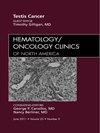基因标记和肿瘤治疗意义。
IF 2.7
3区 医学
Q2 HEMATOLOGY
引用次数: 0
摘要
基因表达特征(GES)是肿瘤学中用于恶性肿瘤分类、预后和治疗反应预测的强大工具。在这篇文章中,我们回顾了国家综合癌症网络使用GES进行治疗计划和临床应用的疾病部位指南。我们确定了4种癌症类型,其治疗决策经常受到GES的影响。GES领域的未来发展可能包括扩大数据来源,以个性化放射治疗剂量和预测对免疫治疗的反应。为了确保所有癌症患者都能从精准肿瘤学中受益,我们可以解决GES中正在面临的挑战。本文章由计算机程序翻译,如有差异,请以英文原文为准。
Gene Signatures and Oncology Treatment Implications
求助全文
通过发布文献求助,成功后即可免费获取论文全文。
去求助
来源期刊
CiteScore
4.10
自引率
0.00%
发文量
86
审稿时长
6-12 weeks
期刊介绍:
Hematology/Oncology Clinics updates you on the latest trends in patient management, keeps you up to date on the newest advances, and provides a sound basis for choosing treatment options. Under the direction of an experienced guest editor, each issue focuses on a single topic in hematology and oncology, including hemostasis and thrombosis, molecular and cellular basis of hematology, coagulation disorders, and cancers—bone, gastrointestinal, head and neck, lymphomas, neuroendocrine, breast, renal cell, melanoma, and more.

 求助内容:
求助内容: 应助结果提醒方式:
应助结果提醒方式:


